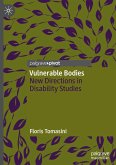The Vulnerability of the Human World
Well-being, Health, Technology and the Environment
Herausgegeben:Boublil, Elodie; Ferrarello, Susi
The Vulnerability of the Human World
Well-being, Health, Technology and the Environment
Herausgegeben:Boublil, Elodie; Ferrarello, Susi
- Gebundenes Buch
- Merkliste
- Auf die Merkliste
- Bewerten Bewerten
- Teilen
- Produkt teilen
- Produkterinnerung
- Produkterinnerung
This book contains the most recent papers problematizing the notions of health, vulnerability, and well-being for individuals and their environment. Organized in 5 sections the book takes into consideration the critical and phenomenological history of well-being and health, their technological manipulation, how these notions connect with the body and the specific vulnerability of the human being, and what responsible direction we can take to improve people's relation to themselves, to other living beings and their environment. In order to address the issue of the vulnerability of the human…mehr
Andere Kunden interessierten sich auch für
![The Vulnerability of the Human World The Vulnerability of the Human World]() The Vulnerability of the Human World97,99 €
The Vulnerability of the Human World97,99 €![State of Arsenic Contamination & Community Vulnerability in Bangladesh State of Arsenic Contamination & Community Vulnerability in Bangladesh]() Md. Motaleb Hossain SarkerState of Arsenic Contamination & Community Vulnerability in Bangladesh56,99 €
Md. Motaleb Hossain SarkerState of Arsenic Contamination & Community Vulnerability in Bangladesh56,99 €![Vulnerable Bodies Vulnerable Bodies]() Floris TomasiniVulnerable Bodies41,99 €
Floris TomasiniVulnerable Bodies41,99 €![Key Concepts for Critical Infrastructure Research Key Concepts for Critical Infrastructure Research]() Key Concepts for Critical Infrastructure Research27,99 €
Key Concepts for Critical Infrastructure Research27,99 €![Chasing Tourette's: Time, Freedom, and the Missing Self Chasing Tourette's: Time, Freedom, and the Missing Self]() Lisa Curtis-WendlandtChasing Tourette's: Time, Freedom, and the Missing Self97,99 €
Lisa Curtis-WendlandtChasing Tourette's: Time, Freedom, and the Missing Self97,99 €![Technology and the City Technology and the City]() Technology and the City113,99 €
Technology and the City113,99 €![Medical Jurisprudence and Rules of the Medical Profession Medical Jurisprudence and Rules of the Medical Profession]() Rudolf RammMedical Jurisprudence and Rules of the Medical Profession81,99 €
Rudolf RammMedical Jurisprudence and Rules of the Medical Profession81,99 €-
-
-
This book contains the most recent papers problematizing the notions of health, vulnerability, and well-being for individuals and their environment. Organized in 5 sections the book takes into consideration the critical and phenomenological history of well-being and health, their technological manipulation, how these notions connect with the body and the specific vulnerability of the human being, and what responsible direction we can take to improve people's relation to themselves, to other living beings and their environment. In order to address the issue of the vulnerability of the human world and how to respond to its specific challenges, the contributions in this book discuss the topic from a broad range of perspectives, including anthropological, psychological, sociological, philosophical, and environmental.
Produktdetails
- Produktdetails
- Philosophy and Medicine 148
- Verlag: Springer / Springer International Publishing / Springer, Berlin
- Artikelnr. des Verlages: 978-3-031-41823-5
- 2023
- Seitenzahl: 224
- Erscheinungstermin: 22. Oktober 2023
- Englisch
- Abmessung: 241mm x 160mm x 18mm
- Gewicht: 506g
- ISBN-13: 9783031418235
- ISBN-10: 3031418239
- Artikelnr.: 68409602
- Herstellerkennzeichnung Die Herstellerinformationen sind derzeit nicht verfügbar.
- Philosophy and Medicine 148
- Verlag: Springer / Springer International Publishing / Springer, Berlin
- Artikelnr. des Verlages: 978-3-031-41823-5
- 2023
- Seitenzahl: 224
- Erscheinungstermin: 22. Oktober 2023
- Englisch
- Abmessung: 241mm x 160mm x 18mm
- Gewicht: 506g
- ISBN-13: 9783031418235
- ISBN-10: 3031418239
- Artikelnr.: 68409602
- Herstellerkennzeichnung Die Herstellerinformationen sind derzeit nicht verfügbar.
Elodie Boublil has a PhD in philosophy from McGill University, a MA in philosophy from Sorbonne University (Paris I) and a MA in political science and international relations from Sciences Po Paris. After her PhD, she received a Marie Sklodowska-Curie Fellowship from the European Commission (CNRS, 2015-2017) and the Alexander von Humboldt Fellowship (University of Cologne, 2018-2020). She is now Associate Professor at the University of Paris XII (UPEC), she has published books and papers on phenomenology, ethics, philosophy of health, vulnerability and empathy. Susi Ferrarello, has a Ph.D. in Philosophy from the Sorbonne in Paris, a master in Human Rights and Political Science from the University of Bologna. She has held professorships at Loyola University (Chicago), Switzerland, Sapienza University, and the Florence University of the Arts. Currently, she is an associate professor at California State University, East Bay. She writes for Psychology Today. Among her publications the most recent 'the Ethics of Love' (routledge, 2023), 'the Origin of Bioethics and Human Emotions' (Routledge 2022), Husserl's ethics and practical intentionality (Bloomsbury 2015)
Part 1. Critical history and critical phenomenology of Health and Well-being.- Chapter 1. Global Health and the Collateral Damage Utilitarianism (Kelly Oliver).- Chapter 2. Why does mental illness exist? Considerations on anthropological vulnerability (Thomas Fuchs).- Part 2. Well-Being, Health and Embodiment.- Chapter 3.The Ontological and Ethical Value of Vulnerability (Valeria Bizzari).- Chapter 4. Well-Being, Health, and Human Embodiment: The Familial Lifeworld (Mark J. Cherry).- Part 3. Well-Being, Health and the Environment.- Chapter 5.Being and Aging: A Phenomenology of Time, Place and Illness (Marjolein Oele).- Chapter 6.Vulnerability, Mutual Aid, Empathy (Gerard Kuperus).- Part 4. The Vulnerability of the Human World and Responsibility.- Chapter 7.Pandemic Discrimination and Responsibility for Culturally Vulnerable Groups. A Phenomenological and Bioethical Perspective (Geoffrey Dierckxsens).- Chapter 8. Interdependency, responsibility and the care for the living (Elodie Boublil).- Part 5. The vulnerability of the human world. Health, technology and the environment.- Chapter 9. From digital medicine to embodied care (Francesca Brencio).- Chapter 10. Aiming at Well-Being with Brain Implants: Any risk of Implanting Unprecedented Vulnerabilities? (Frederic Gilbert).- Chapter 11. Phenomenology of algorithms and emotions in cases of early re-hospitalization (Susi Ferrarello).- Chapter 12. Conclusion.
Part 1. Critical history and critical phenomenology of Health and Well-being.- Chapter 1. Global Health and the Collateral Damage Utilitarianism (Kelly Oliver).- Chapter 2. Why does mental illness exist? Considerations on anthropological vulnerability (Thomas Fuchs).- Part 2. Well-Being, Health and Embodiment.- Chapter 3. The Ontological and Ethical Value of Vulnerability (Valeria Bizzari).- Chapter 4. Well-Being, Health, and Human Embodiment: The Familial Lifeworld (Mark J. Cherry).- Part 3. Well-Being, Health and the Environment.- Chapter 5. Being and Aging: A Phenomenology of Time, Place and Illness (Marjolein Oele).- Chapter 6. Vulnerability, Mutual Aid, Empathy (Gerard Kuperus).- Part 4. The Vulnerability of the Human World and Responsibility.- Chapter 7. Pandemic Discrimination and Responsibility for Culturally Vulnerable Groups. A Phenomenological and Bioethical Perspective (Geoffrey Dierckxsens).- Chapter 8. Interdependency, responsibility and the care for the living (Elodie Boublil).- Part 5. The vulnerability of the human world. Health, technology and the environment.- Chapter 9. From digital medicine to embodied care (Francesca Brencio).- Chapter 10. Aiming at Well-Being with Brain Implants: Any risk of Implanting Unprecedented Vulnerabilities? (Frederic Gilbert).- Chapter 11. Phenomenology of algorithms and emotions in cases of early re-hospitalization (Susi Ferrarello).- Chapter 12. Conclusion.
Part 1. Critical history and critical phenomenology of Health and Well-being.- Chapter 1. Global Health and the Collateral Damage Utilitarianism (Kelly Oliver).- Chapter 2. Why does mental illness exist? Considerations on anthropological vulnerability (Thomas Fuchs).- Part 2. Well-Being, Health and Embodiment.- Chapter 3.The Ontological and Ethical Value of Vulnerability (Valeria Bizzari).- Chapter 4. Well-Being, Health, and Human Embodiment: The Familial Lifeworld (Mark J. Cherry).- Part 3. Well-Being, Health and the Environment.- Chapter 5.Being and Aging: A Phenomenology of Time, Place and Illness (Marjolein Oele).- Chapter 6.Vulnerability, Mutual Aid, Empathy (Gerard Kuperus).- Part 4. The Vulnerability of the Human World and Responsibility.- Chapter 7.Pandemic Discrimination and Responsibility for Culturally Vulnerable Groups. A Phenomenological and Bioethical Perspective (Geoffrey Dierckxsens).- Chapter 8. Interdependency, responsibility and the care for the living (Elodie Boublil).- Part 5. The vulnerability of the human world. Health, technology and the environment.- Chapter 9. From digital medicine to embodied care (Francesca Brencio).- Chapter 10. Aiming at Well-Being with Brain Implants: Any risk of Implanting Unprecedented Vulnerabilities? (Frederic Gilbert).- Chapter 11. Phenomenology of algorithms and emotions in cases of early re-hospitalization (Susi Ferrarello).- Chapter 12. Conclusion.
Part 1. Critical history and critical phenomenology of Health and Well-being.- Chapter 1. Global Health and the Collateral Damage Utilitarianism (Kelly Oliver).- Chapter 2. Why does mental illness exist? Considerations on anthropological vulnerability (Thomas Fuchs).- Part 2. Well-Being, Health and Embodiment.- Chapter 3. The Ontological and Ethical Value of Vulnerability (Valeria Bizzari).- Chapter 4. Well-Being, Health, and Human Embodiment: The Familial Lifeworld (Mark J. Cherry).- Part 3. Well-Being, Health and the Environment.- Chapter 5. Being and Aging: A Phenomenology of Time, Place and Illness (Marjolein Oele).- Chapter 6. Vulnerability, Mutual Aid, Empathy (Gerard Kuperus).- Part 4. The Vulnerability of the Human World and Responsibility.- Chapter 7. Pandemic Discrimination and Responsibility for Culturally Vulnerable Groups. A Phenomenological and Bioethical Perspective (Geoffrey Dierckxsens).- Chapter 8. Interdependency, responsibility and the care for the living (Elodie Boublil).- Part 5. The vulnerability of the human world. Health, technology and the environment.- Chapter 9. From digital medicine to embodied care (Francesca Brencio).- Chapter 10. Aiming at Well-Being with Brain Implants: Any risk of Implanting Unprecedented Vulnerabilities? (Frederic Gilbert).- Chapter 11. Phenomenology of algorithms and emotions in cases of early re-hospitalization (Susi Ferrarello).- Chapter 12. Conclusion.








